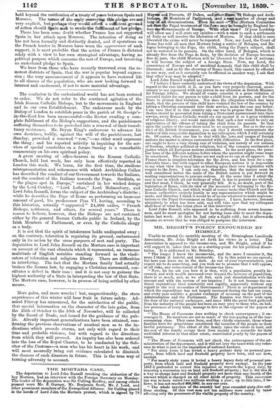THE MORTARA CASE.
The deputation to Lord John Russell touching the abduction of the boy Mortara, had an interview with the Foreign Secretary on Monday. The leader of the deputation was Sir Culling Eardley, and among others present were Mr. S. Gurney, Mr. Benjamin Scott, Mr. J. Lord, and other prominent members of the Evangelical Alliance. Sir Culling placed in the hands of Lord John the Mortara protest, which is signed by 79
Mayon and Provosts, 27 Dukes, and.othertisses,12 Bishops and Arch- bishops, 36 Members of Parliament, and a wait auiraber of clergy and
laity of all denominations. Then lie -said—"The Mortara Committee ask that.the Papal treatment of thelews may be'brought by England be- fore tise*Governments of Europe. 'With what 'view? If your Lordship
will allow me I will state my opinion—with a view to such a settlement of Italy as will involve the liberation of Mortara. If that child is once liberated the crime will never be repeated. Now, my Lord, the Court of Rome has told all men that Mortara being a native of Bologna, and Bo- logna belonging to the Pope, the child, being the Pope's subject, shall not be restored to its parents. On the other hand, if Bologna, which is already free from the Pope de facto, by the decision of Europe becomes free de jure, the child Mortara will be liberated by the law of nations; it will become the subject of a foreign State. Now, my Lord, the conscience of Europe and of mankind demands that this child shall be liberated ; and as by the showing of Rome itself, this cannot be effected in one way, and as it certainly can be effected in another way, I ask that that other way may be adopted."
Lord John Russell replied as follows:— "I believe I have correctly understood the views of the deputation. With regard to the ease itself, it is, as you have very properly observed, unne-
cessary to use argument with any person in my situation as British Minister for Foreign Affairs. We should of course consider it a gross violation of parental rights for any person to take a child from its parents, and for the State to protect that violation. Nor does the allegation which has been made, that the parents of this child have violated the law of the country by taking a Christian nursemaid into their service, make the case any better. I am sure that if in this country any one was to propose that Roman Ca- tholics should be prevented from taking a Protestant nurserymaid into their service, every Roman Catholic would cry out against it as a gross violation of religious liberty, and would maintain that such a law would be only an aggravation of the offence of taking the child from its parents. So that upon the justice of the case there need be no argument. But as to the con- duct of the'British Government, you ask that I should communicate the wishes of this respectable deputation to my colleagues, which I will certainly do. Of course, when one has to deal with the laws and usages of foreign nations the matter is always surrounded with difficulties. In the first place, one ought to have a very strong case of violation, not merely of our notions of freedom, whether political or religious, but of the common sentiments of justice which all European nations entertain. In the next place, the pecu- liar laws of the different nations before whom the question might come must be considered. The laws of Rome are not such as we can at all approve. In France there is complete toleration for the Jews, and has been for a con- siderable time ; but with regard to other European nations it is impossible to say what view they may take as bearing upon their own legislation with respect to the Jews. I can only say, therefore, that the matter must be well considered before the name of the British nation is put forward in making representations to procure redress. At the same time I admit the case is one in which all our feelings of what is due to parents are violated, and that must, I think, be very 'generally felt. It is, no doubt, part of the legislation of Rome, with its view of the necessity of belonging to the Ro- man Catholic Church, and which would of course make that Church and the Roman authorities entirely hostile to any representation which might be made, and therefore I think it would be of no use whatever to make represen- tations to the Papal Government on this subject. I have, however, hstened attentively to what has been said, and will take care that my colleagues shall hear of what has taken place at this interview." Lord John Russell, who appeared to be suffering from severe hoarse- ness, said he must apologize for not having been able to meet the depu- tation last week. At first he had only a slight cold ; but it afterwards became so severe that he was obliged to postpone the interview.


































 Previous page
Previous page